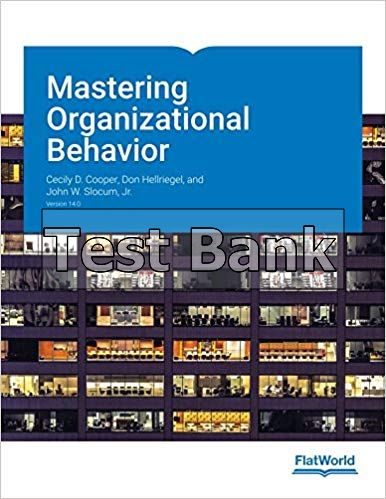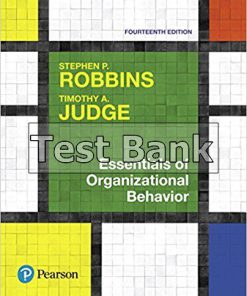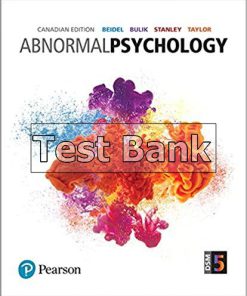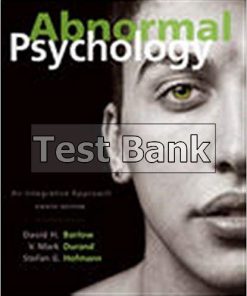Mastering Organizational Behavior 14th Edition Cooper Test Bank
$26.99$50.00 (-46%)
Mastering Organizational Behavior 14th Edition Cooper Test Bank.
You may also like
Instant download Mastering Organizational Behavior 14th Edition Cooper Test Bank pdf docx epub after payment.

Product details:
- ISBN-10 : 1453379495
- ISBN-13 : 978-1453379493
- Author:
Mastering Organizational Behavior equips readers to become high-performance managers in today’s business world. Learners gain a solid foundation in organizational behavior with this unique, competency-based approach. Students are encouraged to assess and maximize their personal skills within the context of today’s organizational behaviors, as they learn to master seven core managerial competencies most important for success – managing self, ethics, communication, diversity across cultures, teams, and change. This edition establishes a clear connection between classic theory, contemporary research, and emerging trends. It has been updated with new events and business cases.
Table of contents:
Chapter 1: Learning about Organizational Behavior
- 1.1 Leadership versus Management
- 1.2 Learning Framework
- 1.3 Ethics Competency
- 1.4 Self Competency
- 1.5 Diversity Competency
- 1.6 Across Cultures Competency
- 1.7 Communication Competency
- 1.8 Teams Competency
- 1.9 Change Competency
- 1.10 Chapter Summary
Chapter 2: Individual Differences and Job Attitudes
- 2.1 Bases of Personality
- 2.2 Personality and Behavior
- 2.3 Cross-Cultural Differences
- 2.4 Work-Related Attitudes
- 2.5 Chapter Summary
Chapter 3: Perceptions and Attributions
- 3.1 Perceptual Process
- 3.2 Perceptual Selection
- 3.3 Person Perception
- 3.4 Perceptual Errors
- 3.5 Impression Management
- 3.6 Attribution Process
- 3.7 Chapter Summary
Chapter 4: Learning and Performance Management
- 4.1 Learning Through Rewards and Punishments
- 4.2 Contingencies of Reinforcement
- 4.3 Schedules of Reinforcement
- 4.4 Social Learning Theory
- 4.5 Chapter Summary
Chapter 5: Motivating Employees
- 5.1 Motivational Processes
- 5.2 Influencing Performance Expectations
- 5.3 Ensuring Equity
- 5.4 Designing Jobs
- 5.5 Combining Intrinsic and Extrinsic Approaches
- 5.6 Chapter Summary
Chapter 6: Motivation: Goal Setting and Reward Programs
- 6.1 Model of Goal Setting and Performance
- 6.2 Effects of Goal Setting
- 6.3 Reward Programs for Improving Performance
- 6.4 Chapter Summary
Chapter 7: Workplace Stress and Aggression
- 7.1 Concept of Stress
- 7.2 Primary Stressors
- 7.3 Severe Stress
- 7.4 Individual Differences and Stress
- 7.5 Stress Management
- 7.6 Workplace Aggression
- 7.7 Chapter Summary
Chapter 8: Interpersonal Communication in Organizations
- 8.1 Elements of Interpersonal Communication
- 8.2 Ethical Interpersonal Communications
- 8.3 Nonverbal Communication
- 8.4 Intercultural Communication
- 8.5 Interpersonal Communication Networks
- 8.6 Chapter Summary
Chapter 9: Promoting Fairness and Trust
- 9.1 The Art of Managing Fairly
- 9.2 The Nature of Trust
- 9.3 Repairing Broken Trust
- 9.4 Trust Within Teams
- 9.5 Chapter Summary
Chapter 10: Leadership Effectiveness: Foundations
- 10.1 Power and Interpersonal Influence
- 10.2 Legacy Leadership Models
- 10.3 Leader-Member Exchange
- 10.4 Chapter Summary
Chapter 11: Leadership Effectiveness: New Perspectives
- 11.1 Transactional Leadership
- 11.2 Transformational Leadership
- 11.3 Ethical Leadership
- 11.4 Authentic Leadership
- 11.5 Chapter Summary
Chapter 12: Developing and Leading Teams
- 12.1 Introduction to Groups and Teams
- 12.2 Team Development
- 12.3 Types of Work-Related Teams
- 12.4 Core Influences on Team Effectiveness
- 12.5 Potential Team Dysfunctions
- 12.6 Chapter Summary
Chapter 13: Managing Conflict and Negotiating Effectively
- 13.1 Types of Conflict
- 13.2 Conflict Levels
- 13.3 Interpersonal Conflict-Handling Styles
- 13.4 Negotiation in Conflict Management
- 13.5 Across Culture Negotiations
- 13.6 Chapter Summary
Chapter 14: Managerial Decision Making
- 14.1 Decision-Making Conditions
- 14.2 Bounded Rationality
- 14.3 Evidence-Based Management
- 14.4 Political Decision Making
- 14.5 Creative Decision Making
- 14.6 Chapter Summary
Chapter 15: Organization Design
- 15.1 Key Factors in Organization Design
- 15.2 Fundamentals of Organizing
- 15.3 Vertical Organizational Design
- 15.4 Horizontal Organizational Design
- 15.5 Chapter Summary
Chapter 16: Cultivating Organizational Culture
- 16.1 Dynamics of Organizational Culture
- 16.2 Types of Organizational Culture
- 16.3 Ethical Behavior and Organizational Culture
- 16.4 Socialization of New Employees
- 16.5 Chapter Summary
Chapter 17: Managing Organizational Change
- 17.1 Pressures for Change
- 17.2 Planned Organizational Change
- 17.3 Resistance to Change
- 17.4 Organizational Diagnosis
- 17.5 Implementing Planned Change
- 17.6 Chapter Summary
Chapter 18: Integrating Cases
- 18.1 Al Dunlap
- 18.2 Valve’s Way
- 18.3 A Day in the Life of Carolina Suarez
- 18.4 The Road to Hell
- 18.5 Bob Knowlton
- 18.6 Whole Foods Market
People also search:
Mastering Organizational Behavior 14th Edition
Mastering Organizational Behavior 14th Edition pdf
Mastering Organizational Behavior
what is behavioral theory of leadership
what is organizational behaviour management
what are the four basic approaches of organizational behaviour
what are the organisational behaviour theories












